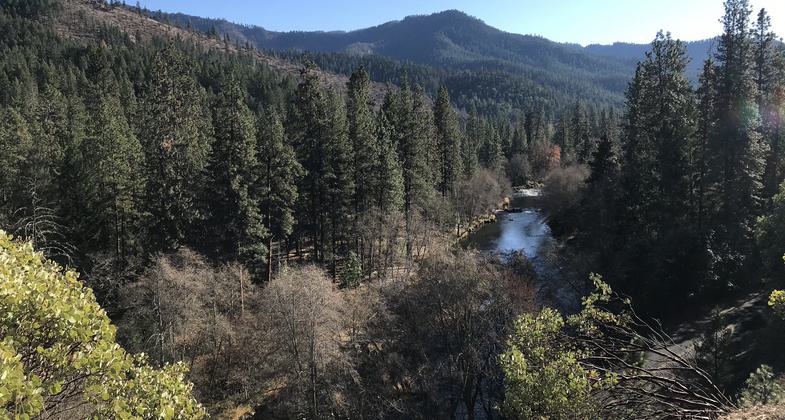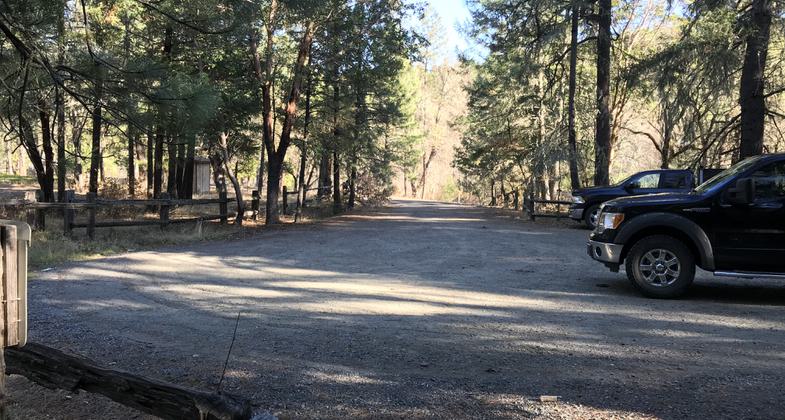Gin Lin Trail
check with the trail manager for updated details before visiting.
Gin Lin Trail
USDA Forest Service
Backcountry Trail
Urban Trail
- Length
0.8 miles
- Elevation Gain
--
- Route Type
Loop
- Length
0.8 miles - Elevation Gain
-- - Route Type
Loop
Traveling through a light forest canopy the Gin Lin Mining Trail traverses a moderate east-facing slope in the Applegate River valley. This short interpretive trail treks through a historic mining site dating from the 1850s. Poison oak grows close to the trailing edge, so keep an eye on children and pets. This is an interpretive trail with a free brochure available at the Applegate and Ashland Ranger District Offices.

Applegate River from the trail. Photo by Pam Riches.

Parking Area. Photo by Pam Riches.
Location: Southwest of Medford, OR near the Applegate River.
- States: Oregon
- Counties: Jackson
Traveling through a light forest canopy the Gin Lin Mining Trail traverses a moderate east-facing slope in the Applegate River valley. This short interpretive trail treks through a historic mining site dating from the 1850s. Poison oak grows close to the trailing edge, so keep an eye on children and pets.
This is an interpretive trail with a free brochure available at the Applegate and Ashland Ranger District Offices.
This three-quarter-mile trail traces the remains of a late-nineteenth-century hydraulic gold mining operation in what was known as the Palmer Creek Diggings, now a part of the Rogue River National Forest.
History
A prominent Chinese mine boss by the name of Gin Lin purchased mining claims in this area in 1881. Gin Lin was one of thousands of Chinese sojourners who came to Oregon during the nineteenth century to seek their fortunes. He probably arrived in southern Oregon in the early 1860s, when his name first appears in the historical records.
The anti-Chinese sentiment was widespread on the Pacific Coast when Gin Lin came to Oregon. Chinese workers were singled out for special taxes. These included a mining tax in Jackson and Josephine counties, first levied in the 1850s, and a statewide annual poll tax, instituted in 1862. The original 1857 state constitution also stated that "no Negro, Chinaman or Mulatto shall have the right of suffrage." Despite the state's institutionalized discrimination against them, Chinese men came by the thousands to work in Oregon's mines, salmon canneries, and agricultural fields.
Gin Lin recruited many of his fellow countrymen to work his mines, the first of which he purchased in 1864. He gradually acquired more land over the years and had his men build miles of ditches to serve the newly established mines. One of the largest is still known as China Ditch.
Gin Lin returned to China in 1894. A very rich man by this time, he is rumored to have been murdered by robbers, though this story has never been verified in the Chinese archives. Although little is known about his final days, his legacy is still visible in the landscape.
Accessibility Information
No text provided.
Allowed Uses:
Swimming Dogs, on leash Hiking/WalkingPublic Contact
Steve JohnsonRogue River-Siskiyou National Forest
Siskiyou Mountains Ranger District
Jacksonville, OR 97530
[email protected] • (541) 899-3800
www.fs.usda.gov/main/rogue-siskiyou/home
Contact the trail manager for current maps and visiting details.
More Details
- Elevation (low): 1700
- Elevation (high): 1828
- Elevation (cumulative): --
- Part of a Trail System? No
- Surface (primary): Soil
- Surfaces (additional): Soil
- Tread Width (average): 24"
- Tread Width (minimum): --
- Running length (minimum): --
- Tread Grade (average, percent): 10
- Tread Grade (maximum):
- Running length (maximum): --
- Cross-slope (average, percent): --
- Cross-slope (maximum): --
- Running length (maximum): --
- Certified as an NRT
Oct 4, 1979

